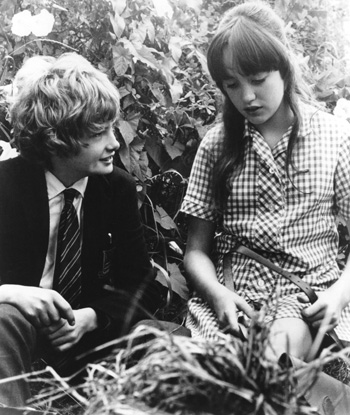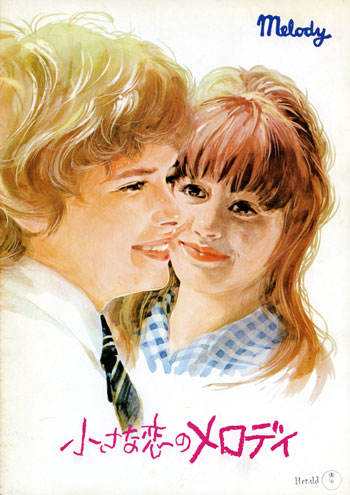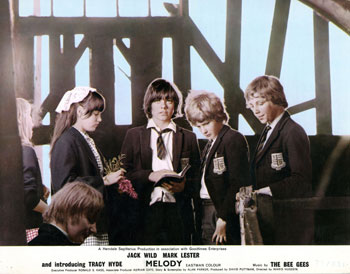 |
||||||||||

There’s a danger in revisiting movies that have been childhood favorites—that they won’t live up to fond memory. I probably hadn’t seen Melody in twenty years, but I recently discovered it was available on DVD as a Japanese import. Don’t be surprised if you’ve never heard of the film. I won’t claim it’s a lost classic. But for me, it was one of those movies that I saw while I was growing up—at an impressionable point in life—that has given it lingering resonance. Seeing Melody again, I was thrilled to find that the film holds up, that it seemed as lively, well made and charming as I’d remembered it to be. Though I’m not exactly an objective viewer. And of course, the movie for me is now imbued with an extra layer of personal meaning and memory—of the way I was when I first saw it, then a kid more or less like the kids in the film.
Melody (1971) is very much of its time. It’s about vibrant, youthful rebellion in the face of a musty, deadened adult world that offers little hope for a happy future. The film plays out very much like a prepubescent If…, with a bit of The Graduate at the end (which may or may not be deliberate). There’s some running business about a boy making a homemade bomb with a soup can and fertilizer. Repeatedly it sputters and fizzles—until, of course, the film’s climax. Melody’s 10-year-old heroes, “Danny” and “Ornshaw” (Mark Lester and Jack Wild) come from opposite sides of the tracks. Danny is primped and pampered by his pretentious, upper middle class mum, while Ornshaw is unkempt and runnin’ wild, living with an ailing granddad. It’s the attraction of opposites. The plot kicks in when Danny falls under the spell of a pretty classmate, the titular “Melody” (Tracy Hyde). After a shy exchange of glances and some awkward moments, it becomes clear the feeling is mutual. Seriously and truly in love, Danny and Melody start to ask why they must wait to be grown up before they can marry. Indeed, they refuse to wait, to the bewilderment and consternation of the adults!
Director Waris Hussein never did much else of note (Edward & Mrs. Simpson for TV, Divorce His/Divorce Hers with Taylor and Burton), so it’s hard to know who to credit for the film’s spirited freshness. Despite it’s obvious messages, it rarely falls into simple counter-cultural tract. The rest of the production team does feature some notable names, including producer David Puttnam, screenwriter Alan Parker, and cameraman Peter Suschitzky. There’s also a consistently tuneful song score by the Bee Gees (some years before Saturday Night Fever fame) that gives the film a surprising sophistication and poignancy. I think you’d recognize some of the songs—at least if you’re of my generation—including “To Love Somebody,” Give Your Best” and “First of May.” Some of Melody’s most lovely moments come during the entirely visual sequences that play off the music. For example, Danny and Ornshaw’s spur-of-the-moment trip into London and the young lovers’ day of escape at a seaside carnival. These scenes are enlivened by the faces of everyday people and playful antics that feel largely improvised (Wild takes a mock George C. Scott pose in front of a Patton poster). The angelic Lester and cut-up Wild have a natural rapport that no doubt stems from their experience working together on the Oscar-winning Oliver.
At the end of the film, after the teachers and parents have been routed, Danny and Melody escape together into the vast horizon of the future. How Melody made me long for the fearless confidence and optimism of my youth—for a time when anything seemed possible! And what became of these young rebel spirits exemplifying the children of the sixties? Today we know they grew up into adults much like their parents.
When I was small and Christmas trees were tall
we used to love while others used to play.
Don’t ask me why the time has passed us by,
someone else moved in from far away.
Now we are tall and Christmas trees are small
and you don’t ask the time of day.
But you and I, our love will never die.
Guess who’ll cry come first of May. —First of May, the Bee Gees
Six years ago, when this piece first ran in Audience Magazine (AudienceMag.com), my assumption was that Melody was completely forgotten. To my great surprise, I received more letters about this story than any I have ever written—by far! They came literally from all over the world, professing a similar abiding affection for the film. If anyone owns the American rights, they are really missing the boat by not getting Melody out on DVD!
At right, mementos of Melody from the Teegarden/Nash Collection: A still, Japanese program, lobby card, and Mark Lester fan photo.
—John Teegarden
This article originally appeared in Audience Magazine (AudienceMag.com).


